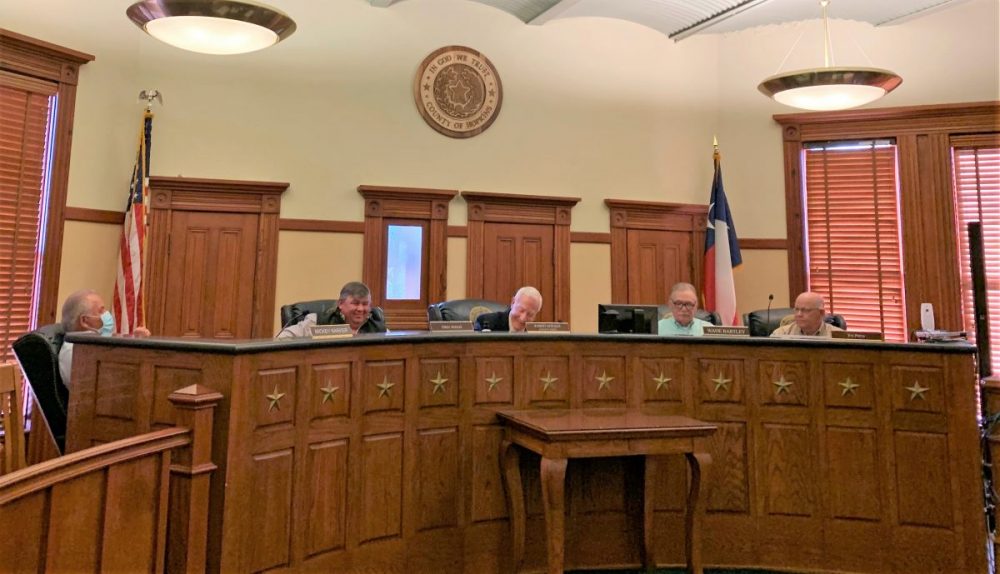HVAC Units For Courthouse, Building Consulting Services, Donations, Agreement with City Approved By Commissioners Court
Lewis Crain of Rutherford, Crain & Company, PC, when presenting the audit during the April 12, 2021 Hopkins County Commissioners Court, say despite a strange year, Hopkins County’s financials look good as far as the annual independent review.
Crain repors the biggest change in revenues between the 2018-19 to 2019-20 fiscal years was $2.5 million received in grant funding the county received, the biggest chunk of which was federal assistance awarded to assist during COVID-19.
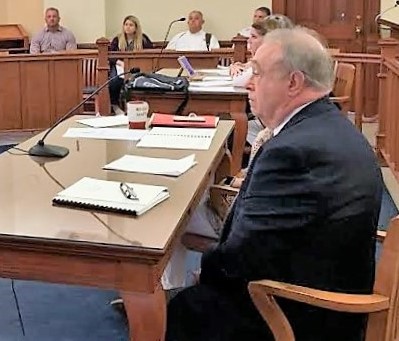
When expenditures were in, the county came out $786,000 ahead. Overall, the general budget finished $357,000 ahead of the projected budget. Departmentally, most came in at or under budget, with the exception of the sheriff’s office. The sheriff’s office entered into lease agreements for Tahoes for deputies to drive, which gives the appearance that HCSO is over budget, that had to be amended or adjusted.
Crain noted the pension liability dropped from $7.8 to $4.6 million, a reduction of almost 40 percent. The county made $5.8 million in investments, better than the $681,000 loss from the previous year. The pension fund picked up $3.5 million, and is doing very well, Crain reported.
He praised Beth Wisenbaker, who serves as grants coordinator or the county, Auditor Shannah Aulsbrook and staff and Treasurer Danny Davis for their work and careful stewardship of county funds. He also cautioned the county to be very careful when allocating from the most recent round of federal COVID-19 funding as the Treasury Department is writing the rules, so rules could be different and very specific regarding expending of funds and documentation. Entities for up to 5 years could be among those randomly selected by the feds for audits.
“You have done a very good job here,” Crain said. “We found no problems we have not reported here. It was a simple audit, a fair audit.”
Bright Arrow Solar
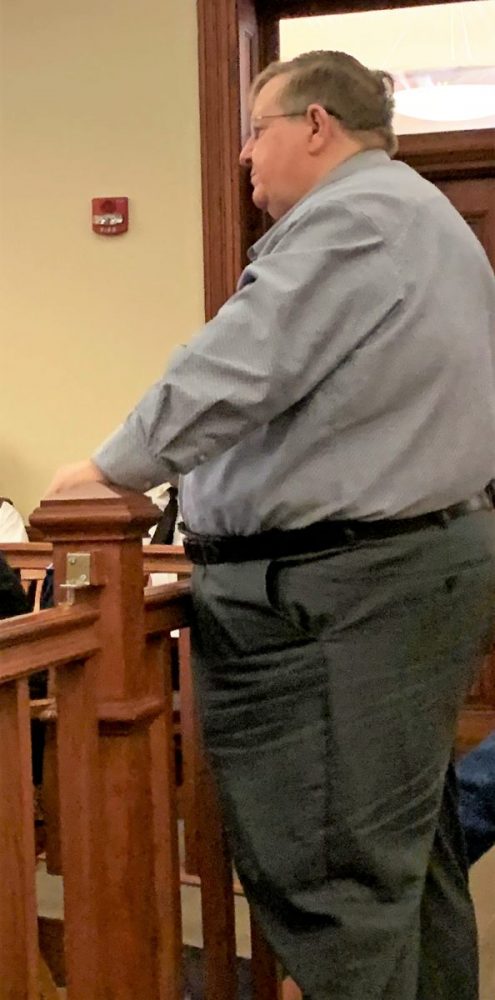
The Commissioners Court approved a resolution agreeing to a 381 agreement with Bright Arrow Solar, LLC, giving the county a $360,000 annual payment to the county in lieu of taxes (PILOT) for the $275 million solar project to be constructed in northwestern Hopkins County, or about 60 percent.
When asked why the payment is $260,000 instead of $1.7 million, which would be closer to 60 percent of the taxable value on the project is $275 million initially, but would be depreciate annually, and if perhaps the number negotiated for the agreement couldn’t have been for a larger PILOT, Sulphur Springs-Hopkins County Economic Development Corporation Executive Director Roger Feagley said the PILOT payment is based on industry standard established from West Texas to this area.
When asked if he thought the solar company would have agreed to a larger PILOT to benefit the county more to located the project in Hopkins County or have gone somewhere else, Feagley said he believes the company would have gone elsewhere.
Later, Feagley the “amount paid is not on taxable value but is based on the nameplate capacity.” For instance, a 300 megawatt facility would be charged a fee per megawatt, plus an additional fee for any batteries if those are used as well.
Currently, the project is projected to be completed in 2023, the first tax year, according to Feagley.
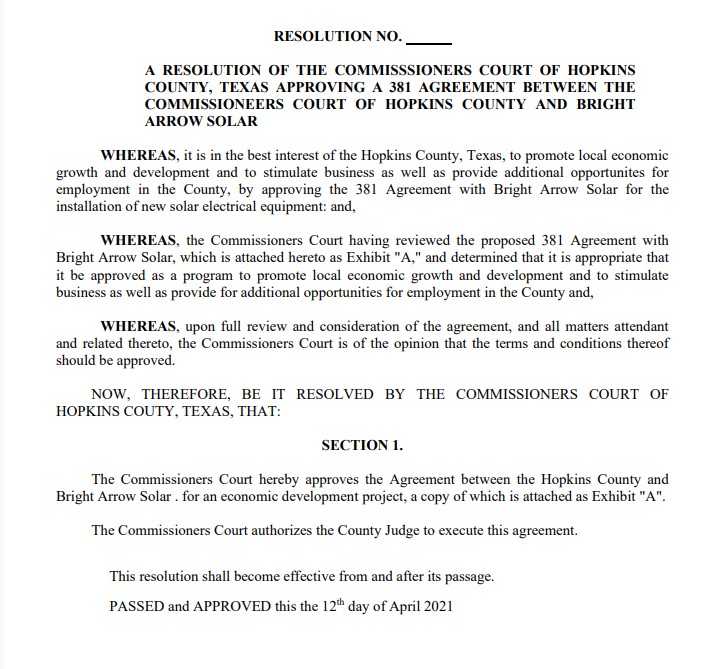
Opposing HB 749/SB 234
The Commissioners Court also adopted a resolution opposing Senate Bill 234 and House Bill 749, which the court contends are efforts to silence county officials. The bills would “prohibit county funds from being used to join or support nonprofit associations that provide collective communication to state legislators.” Most counties don’t engage private lobbyists and only pay a small amount in membership dues to nonprofit county associations to communicate with the legislature on their behalves. Corporate and special interest lobbying account for 90 percent of total lobbying , not taxpayer-funded lobbying by local governments, the resolution notes. While the state and legislature employs numerous taxpayer-funded lobbying to monitor bills and advocate in Washington, SB 234 and HB 749 would deny local communities that same right. This places rural counties, which the majority to Texas is composed of, at a disadvantage in presenting a unified voice to federal and state legislative bodies, the resolution states.
“It is a false claim that taxpayer funded lobbying works against the interested of taxpayers. Indeed, a priority of county government and it’s ‘lobbying’ effort is focused on ending the state and federal practice 0f passing unfunded mandates, which impose billions of dollars in increased taxes upon local property taxpayers annually,” Newsom read from the resolution.
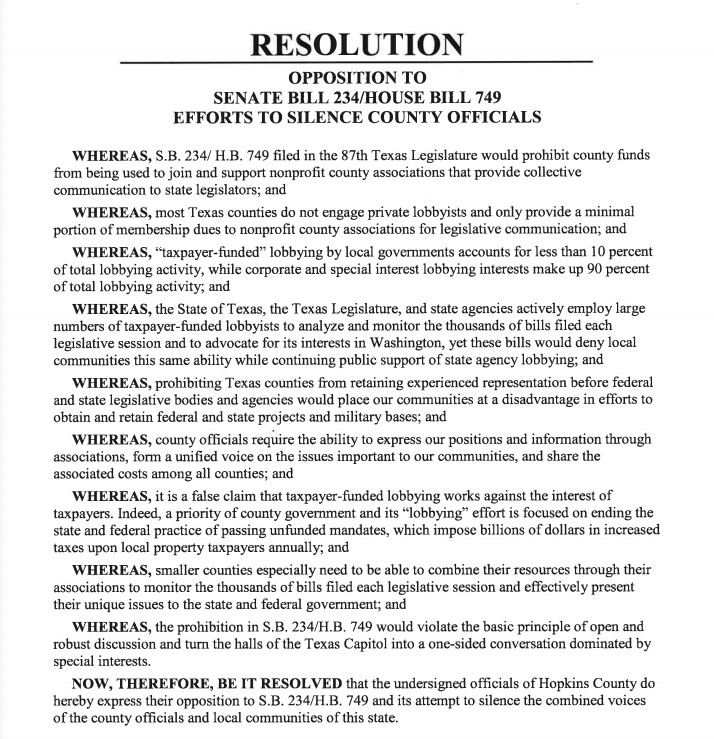
Other Business
In other business Monday, April 12, Hopkins County Commissioners Court approved a $44,675 for replacement of two HVAC systems at Hopkins County Courthouse. The 126-year-old structure, while maintained was in much need of new heaving and air conditioning systems. They have a professional services contract with Williams. They had the option of replacing one unit at a cost of $32,560 or two units for $44,575. The commissioners opted to take advantage of the savings on the second unit and have both replaced while the weather is still relatively mild, a welcome improvement over the historic lows recorded in February, and the heat of late spring and summer.
Tom Glosup was approved to provide consulting services to the county for the 12 county-owned buildings, which include regularly checking all except the precinct barns, to ensure routine repairs and maintenance are performed on schedule, including establishing a schedule for certain items. Glosup will audit the facilities for $5,000, then beginning in June would be $1,000 per month to serve as a contract building consultant, the latter the amount budgeted previously for the service. The contract could be renewed annual. If he sees anything that needs to be taken care of he will alert maintenance or make county officials aware if he in instances in which insurance claims should be filed. The county judge said it’s his understanding Glosup will check in once weekly to make sure the big picture is being tended as far as building maintenance is concerned.
A donation of $3,000 from a county resident was accepted to help cover costs for the county to rock CR 1168, which has been pretty much a dirt haul path for many. The couple making the donation decided to built a house in that area and donated funding to put rock over it to make accessing their home from the road easier.
The sheriff’s office received donations of six stainless steel tables and 24 bunks which make 48 beds taken from Hunt County’s old jail to be stored and used as needed in the future at the county jail.
The annual agricultural lease of agreement in which the city pays the county $2 to obtain sand from the old Thermo mine to use in road building too received Commissioners Court approval.
Commissioners agreed to lease space on two of the county’s communications towers to Community Internet Providers LLC at a rate of $500 a month, which will offset the cost of leasing two towers for sheriff’s office and fire department communications. The service then would help expand internet to rural schools and homes in areas that do not currently have service or full service. The company, County Judge Robert Newsom reported, has talked about the possibility of reaching out to local volunteer fire departments to provide them with internet service in exchange for serving as a host site for the service as well, which would not only give the fire departments the connectivity needed for fire department reporting but would also make Internet service available to others within a 5-mile area.
At the request of Robert Newsom, the county judge and Jason Cunningham were appointed to serve on the Board Of Directors of The Northeast Texas Housing Finance Corporation, an organizations that periodically is able to hep provide low cost housing across the Northeast Texas region and through Ark-Tex Council of Governments.
